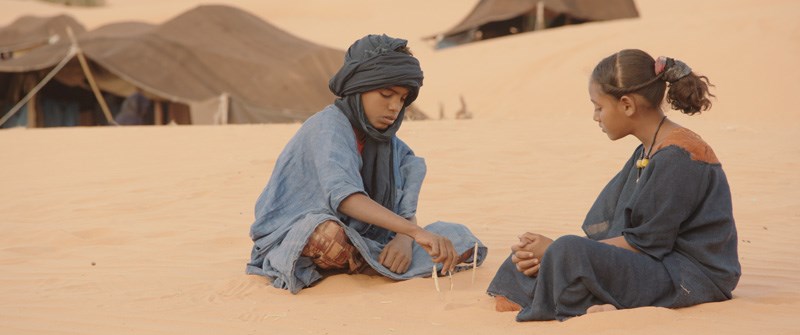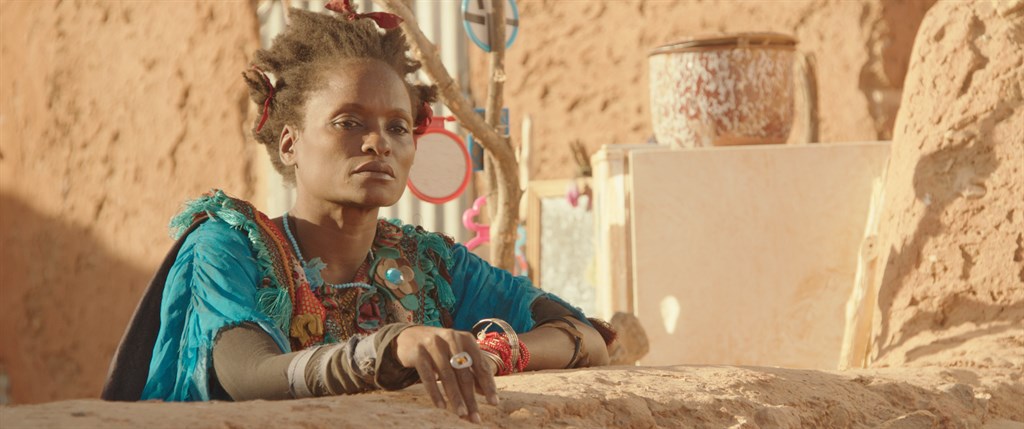
Photo: Ibrahim Ahmed and Layla Walet Mohamed in “Timbuktu”/2014 Les Films du Worso – Dune Vision
Nestled in the dunes just outside of Timbuktu, a Malian city recently taken over by militant Islamists, a music-loving cattle herder, Kidane, lives quietly with his wife, Satima, and his 12-year-old daughter, Toya. Inside the city, as the Ansar Dine (‘Defenders of the Faith’) impose new rules ‘based on Sharia law’, residents grow increasingly frustrated with the oppression – women are penalized for not wearing veils and gloves (even while cleaning and selling fish); music, cigarettes, football and sitting outside of homes have all been banned (even while members of the jihadist group steal cigarette breaks, avidly discuss football matches amongst themselves and take a brief moment to sit and listen to the music before bursting inside homes to arrest the offenders).
Inspired by the horrific abduction and stoning to death of an unmarried couple who were found to have two children in Northern Mali in July 2012, Abderrahmane Sissako’s Timbuktu is a thoughtful, complex and insightful vignette into life under militant jihadists. With a subject matter so easy to sensationalize and dramatize, Sissako uses his signature fragmented storytelling to give us glimpses into various stories inside and outside the city, often peppered with humor. This results in a film far more sensitive and respectful. Beautiful not only in message, but Timbuktu is also a visually poetic film full of beautifully composed shots sparingly interspersed with a graceful and haunting musical score, always choosing to show rather than tell its messages. A stunning sequence shows boys passionately playing football but without a ball, it’s comedic but also their own silent protest as it happens right after a man gets sentenced to lashings for playing the sport. The soft, muted performances of the actors also do wonders to flesh out the characters and the strength of the women, in particular, is explored with finesse, with each approaching the battle for survival in her own way.

Kettly Noël in Timbuktu Cohen Media Group
The truly unique and brave thing about Timbuktu is its willingness to spend time with people on either side of the conflict. It reveals human beings as they truly are – not reduced to digestible good vs. bad, victim vs. abuser paradigms. This caused some controversy as it was interpreted by some as humanizing and therefore, sympathizing with the jihadists. The film opens with the jihadists chasing a gazelle with guns, not to kill but to tire it. They shoot at traditional and cultural artifacts. As the film progresses, they whip people as punishment for trivial matters such as owning a football and singing. They force marriages. They even stone people to death. The film is under no false impression of what they are and the terror and destruction they leave in their wake. But they are also kids and buffoons throwing around power. They also sit and debate about football matches. They carefully listen as the local imam talks to them about what jihad means and how they are hurting Islam and Muslims. They joke, they laugh, they are clumsy – and that is why it is so impactful and all the more horrifying when they commit heinous acts. That is what makes them so lethal. These people aren’t a different breed – they are us. Humans. Flawed. We must address this.
In fact, a central storyline unveiled halfway through the film reveals that even a mostly-benevolent, guitar-strumming cattle herder, given the right frustrations can turn violent but as the events unfold, taking an eye for an eye never works. Sissako explains to Aljazeera, “It is important to not fall into caricature […] We cannot deny humanity. An act is inhuman but it is always done by someone similar to us in a way. The movie aims at condemning all forms of barbarism and efforts to cover up the truth. These people are condemned because of what they do. But I gave them humanity because if you don’t, the risk is that you will lose your own humanity.”
Although released in 2014, the sheer importance of this message is still relevant demonstrated by the recent Mali massacre on 23rd March of a Fulani village where more than a 150 people, including children and babies, were brutally killed. The latest in an increasingly deadly circle of violence, it is believed militia from the Dogon ethnic group formed for ‘self-defense’ against al-Qaeda-linked militants, which have in the past attracted large numbers of Fulani, is responsible for the attack as they now indiscriminately perceive the Fulani people as linked to the jihadists. This goes to show, we need to be careful when demonizing the other side and trying to fight violence with violence. The humanism Sissako gives to the jihadists in his film is his response to the violence and savagery. “Islam is not what the jihadists say it is – Islam is love, forgiveness and compassion, not violence”, he emphasizes.
Some movies deserve to be brought back into the headlines – as their relevance continues to be impactful regardless of the year they were released in – Timbuktu is one such movie. It was rightfully Hollywood Insider supports cinema that transforms and Timbuktu is one such movie that fits with Hollywood Insider’s values as cinema and media when done right can entertain, transform and move us from within to be better or at least understand ourselves.
The film is available on YouTube, Amazon Prime, iTunes, etc.
Actors: Ibrahim Ahmed dit Pino, Toulou Kiki, Layla Walet Mohamed, Abel Jafri
Director: Abderrahmane Sissako
Producer: Sylvie Pialat, Étienne Comar
Writer: Abderrahmane Sissako, Kessen Tall
Cinematographer: Sofian El Fani
By Bhawana Siwa
More Interesting Stories from Hollywood Insider
– Video – Episode 6: Do civilians and public in USA support Trump’s immigration policies? To find out watch Hollywood Insider’s episodic series Messages From America
– Why Rami Malek cannot be blamed for the director Bryan Singer’s faults
– Why Scarlett Johanssen was wrong in stepping down from playing a transgender person
– Bollywood’s first mainstream lesbian romance wins hearts all over the world
– How Barbie wins the diversity game, with an army of “Sheroes” and dolls modeled on Yara Shahidi, Naomi Osaka and many others

Bhawana Siwa is a writer for Hollywood Insider, writing film reviews and the occasional feature. Having grown up with a passion for finding beautiful stories, she aims to put her love of films and TV (and the hours she’s spent watching them) to good use, aiding audiences to wade through the mass to find entertainment that is well-made, meaningful and that helps open their world up a little bit – exactly aligned with Hollywood Insider.








